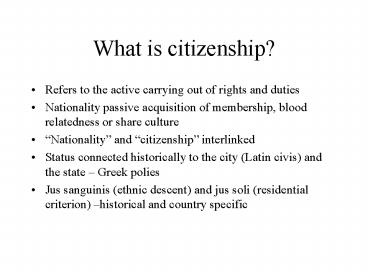What is citizenship - PowerPoint PPT Presentation
1 / 19
Title:
What is citizenship
Description:
Nationality passive acquisition of membership, blood relatedness or share culture ' ... pretentiousness, personal warmth and exuberance, sociability, love of music and ... – PowerPoint PPT presentation
Number of Views:1633
Avg rating:3.0/5.0
Title: What is citizenship
1
What is citizenship?
- Refers to the active carrying out of rights and
duties - Nationality passive acquisition of membership,
blood relatedness or share culture - Nationality and citizenship interlinked
- Status connected historically to the city (Latin
civis) and the state Greek polies - Jus sanguinis (ethnic descent) and jus soli
(residential criterion) historical and country
specific
2
What is ethnicity
- Two diverging discourses
- 1) Primordial fixed, fundamental and rooted in
the unchangeable circumstances of birth - 2) Circumstantialism/constructivists ethnicity
product of concrete social and historical
situations
3
Welsh nationalists
- Other than the Welsh language Welshness is
distinct for their seperate history, instinctive
radicalism in religion and politics, contempt for
social pretentiousness, personal warmth and
exuberance, sociability, love of music and near
obsession with rugby
4
Is there Danish nationalism?
- Nationalist Political Parties?
- Banal nationalism Dannebrog
- Flagpoles in many gardens
- Flying the flag at birthdays, ceremonies,
political party meetings - Ideology of ethnic identification (danskhed),
ethnic criteria of political membership (Danish
citizenship), a state context (Denmark) a claim
to a collective historical destiny (the Danish
way)
5
Tug of war btw the pull of nation-state
cohesiveness and the push of global processes
- Components of nationalism (multiple
potentiality) - Vehicle for ethnic identity and political
identification - Ideological modernization and ardent
traditionalism - For rationality and passion
- For past nostalgia and future hope
- For anonymity and familiarity
- For the most respectable and the despictable
values
6
Connecting policy domains internal and external
to the nation-state
- Extent how the boundaries of membership within a
polity and between polities should be defined - Content how the benefits and burdens of
membership should be allocated - Depth how the thickness of identities of
members should be comprehended and accommodated
7
Citizenship status Marshall (1950)
- Civil rights rights to indivdual freedom,
rights to propety, personal liberty and justice - Political rights political participation
holding office or voting - Social rights economic and social security
within a modern welfare state - Equality
- Recognition
- Economic redistribution dismantle class
inequalities
8
Critic of Marshalls definition
- Ignores the ways in which racialization functions
to obstruct access to full citizenship - Need for a concept that grasps the legal status
dimension as well as the dimension of national
identity (I.e. consciousness of collective
membership) - Formal and substantial citizenship
9
Theories on citizenship
- Liberal (John Stuart Mill, Locke, Rawls)
- Communitarian thick (Sandel, Macintyre) and
thin (Taylor) - Republican (Jean-Jacques Rousseau)
- Differences/Similarities liberty, equality,
pluralism
10
Liberal theory
- Liberty for the individual
- Strong differentiation between public (logic of
rationality)/private sphere (different cultural
and religious ways of life and beliefs) - Justice in the distribution of public goods
11
Communitarian theory
- Community a social and cultural community
shaping the identity of the individual - History, tradition and culture
- Strong distinction between Them and Us (see
Hylland Eriksen)
12
Republican theory
- We have physicists, geometricians, chemists,
astronomers, poets, musicians, and painters in
plenty but we have no longer a citizen among us
Rousseau 1750. - Worries about declining electoral participation
and eroding social capital - Legal status, various privileges/immunities also
commitment to the common good and active
participation in public affairs - Both the individual and community in focus
13
Naturalisation
- Refers to the procedure by which non-nationals
can acquire citizenship - Issue of dual citizenship
14
German case
- Minimum prerequisites for naturalisation(Piper
(1998), p. 88) - 10 year period of residence
- A clean criminal record
- Accomodation in Germany
- A regular income
- Good command of the German language
- Renunciation of the original citizenship
15
EU citizenship
- Emerged 1) Internal Market, 2) need to delineate
individuals with EC member nationality from
citizens of non-member states - Symbolic more than substantial new rights
- Third country nationals (turks living in Germany
fx.) are not included - Intergovernmental not supranational on this field
16
Challenges to the concept of citizenship
- Citizenship as intersecting, multiple and
overlapping - To protect nature
- To enable access to cultural capital
- To recognise ethnic identities
- To eliminate discrimination against women and gays
17
(No Transcript)
18
Denizens
- Pay taxes, access to most social welfare rights
but excluded from political participation - Difficulties in naturalisation
19
Core readings
- Göle, Nilüfer (1996) The forbidden Modern
Civilisation and Veiling. Ann Arbor University
of Michigan Press - Brubaker (1992) Citizenship and Nationhood in
Germany and France - Handbook on citizenship (2002)

